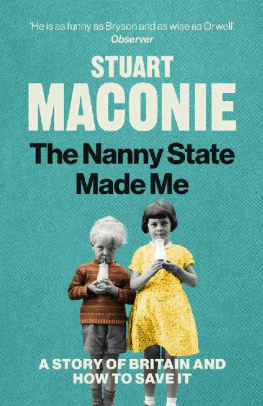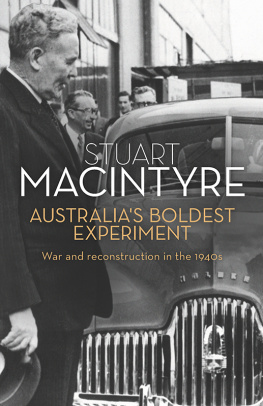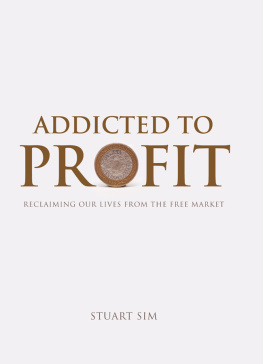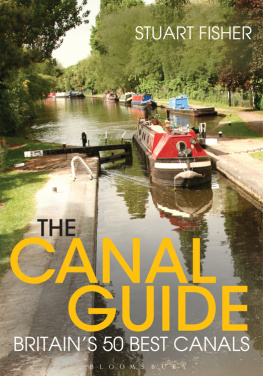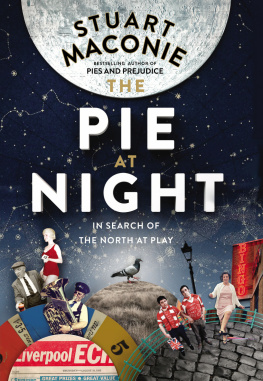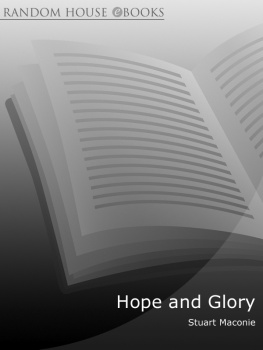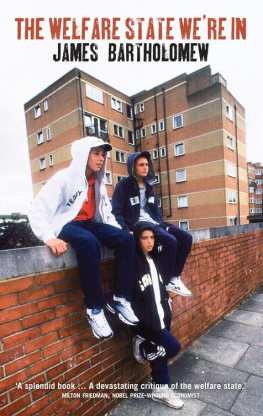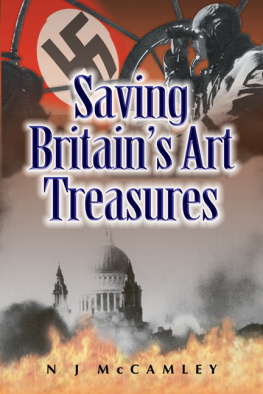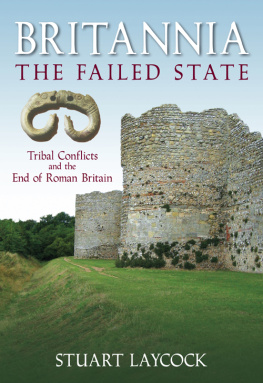
Stuart Maconie
THE NANNY STATE MADE ME
A Story of Britain and How to Save It

CONTENTS
ABOUT THE AUTHOR
Stuart Maconie is a writer, broadcaster and journalist familiar to millions from his work in print, on radio and on TV. His previous bestsellers have included Cider with Roadies, Pies and Prejudice and Adventures on the High Teas , and he currently hosts the afternoon show on BBC 6music with Mark Radcliffe as well as weekly show The Freak Zone . Based in the cities of Birmingham and Manchester, he can also often be spotted on top of a mountain in the Lake District with a Thermos flask and individual pork pie.
Also by Stuart Maconie
Cider with Roadies
Pies and Prejudice
Adventures on the High Teas
Hope and Glory
The Peoples Songs
The Pie at Night
Long Road from Jarrow
For my Mum and Dad, who grew up in a different country. And Noah and Arlo, who still might.
INTRODUCTION
Londons skyline bristles with towers. Old and new, bloody and sleek, sandstone and silicon, monuments to kings and to commerce. From the Amazonian giants of the Citys money jungle to the high-rise canyons of Camden. Visitor and native alike marvel at them, orient by them, lifting eyes from book or phone or feet, as the train exhales into Euston, as the bus crests Muswell Hill, as you jostle through the West End.
Whenever I pace the narrow lanes of Bloomsbury and Fitzrovia, I look up for one in particular. Its a Grade II listed building, much more familiar and human in its dimensions than the boastful monoliths of Canary Wharf. Its had many names and many lovers. It looms over works by Ian McEwan, The Goodies and Alan Moore. It is part of our shared national iconography. It is surely a symbol of something. Glamour, vision, adventure, the white-hot future that was coming.
Early in the twenty-first century, around about the time we were realising that that particular future wasnt coming for most of us down below, I had lunch at the top of that tower in the restaurant that used to revolve, the restaurant of failed dreams, with a man who helped build it. I was filming an interview with Tony Benn, grand old firebrand of the Labour movement, about the buildings history. In 1966, along with holiday-camp magnate Billy Butlin, as Postmaster General he opened what was then called the GPO or General Post Office Tower, a new and thrilling addition to the London skyline, commissioned by the state, designed by civil servants, the draughtsmen and architects of the Ministry of Public Buildings.
Neither of those positions or organisations exist now. When a new Britain began to emerge at the end of the 1970s, as one of the first of what would become countless privatisations, the GPO Tower became first the Post Office Tower, then the Telecom Tower and finally the BT Tower. As Tony Benn and I sat talking in the quiet restaurant eyrie, closed to the public for decades on the vague and spurious grounds of it being a terrorist target, I could sense the mounting anxiety of the slick, besuited PR man lurking nearby. Eventually he sidled over to our table.
Stuart, Tony, hi. I cant help noticing, guys, that youre referring to the building as the GPO Tower, he laughed, nervously. Its not been that for a long, long time, guys. Can I just remind you, its the BT Tower. As in British Telecom, who own it.
Benn fixed him with a stare that combined pity and scorn. Excuse me. I oversaw the opening of this building. It was built using British labour and skills with the money of the British people who paid for it with their taxes. It belongs to them and always will. Margaret Thatcher took it from them and gave it to you when it was not hers to give. This is not your building. It is theirs he pointed to the streets below and the busy, swarming, preoccupied workers and it was stolen from them.
The PR man, wilting and tasting defeat, moved silently back into the shadows. Benn turned to me, rolled his eyes and winked. At that point, the seed of this book was planted. What happened to the GPO Tower was the start of a story.
This is it.
This is my story, your story and how it was stolen from us.
I am a child of the state. You are too. Thats my guess.
We were born into the stern but loving embrace of one of its hospitals, redbrick, concrete, or steel and glass, raised in one of its compact, sturdy little houses and educated in its solid, unshowy but decent schools. Our minds were opened and filled by its silent and magical libraries, its draughty museums and echoing galleries, places of wonder travelled to on buses and trains that were unsexy and asthmatic but ran on time and went regularly to all the places we wanted to go. We ran and laughed and grew healthy and fit and were hale and naughty in its little local parks and huge national ones and its swimming baths reeking of chlorine, its muddied sports fields, on its putting greens and the cracked, weed-choked asphalt of its municipal tennis courts.
I have lived most of my life a happy and grateful citizen of the state. I will die in its arms.
If you are one of those people who styles themselves a libertarian or contrarian, this may make me appear an unthinking automaton, a gulled and brainwashed serf. But perhaps only to those who have lived or who desire an entirely privatised life, born outside the NHS, educated at a private school perhaps, a stranger to public transport and recreation, living somewhere, perhaps even gated, far from the towns and streets most of us knew. These people are fewer than you might think. Most of us will never come into contact with them, never clink a glass with them, never dance with them, never wet their babies heads or put a consoling arm around them. They are few and they are untypical. But they wield a power far in excess of their number, far in excess of what is right for a healthy society. Right now, they are more powerful than they have ever been.
In his column in the 3 December 1965 issue of the Spectator , the Conservative MP Iain Macleod fulminated against those milksops in the Department of Transport who wanted to introduce, of all things, a speed limit on British motorways. Predating by some four decades our current crop of professional white male fulminators (we shall not name them here, as Gandalf used to say of Sauron with a shudder), Macleod went on to grumble at this manifestation of what he termed the nanny state. Thus was minted a phrase which soon became part of our cultural lexicon and political discourse. It crept into our national conversation, via tabloid leaders, letters pages, pub arguments and golf-club chat. It became a shorthand for a way of thinking thats inflicted on us real and lasting damage, a dull pain that we have almost grown used to. Its why Ive written the book you hold in your hand.
The nanny state has become a glib dismissal for all that is seen to be bad, weak and misguided about once-proud Britain. The term is now the blowhard columnists friend, blamed for everything from teenage pregnancies to the erratic form of our fast bowlers. It has become a byword for failure. But I want to tell you that it was the spirit of our finest hour, the backbone of our postwar greatness, the guiding principle of our brief New Elizabethan heyday, our 1960s cultural domination of the globe. Between the end of the Second World War and the early 1980s, Britain produced some of the greatest, most imperishable, popular and pioneering art, science, literature, pop music, comedy, film and sporting achievements the world has ever seen. To a major degree, these were achieved by generations of children of the state. Having defeated global fascism, a ruined country rebuilt itself from rubble thanks to the most progressive government in our history and the talents of its children, kids raised by and large outside of the establishment and the elite on a diet of orange juice, free school milk, NHS specs, Watch with Mother , public libraries, art schools, galleries and all the other benefits of a forward-looking state and a commitment to the public good not the private profit.
Next page
